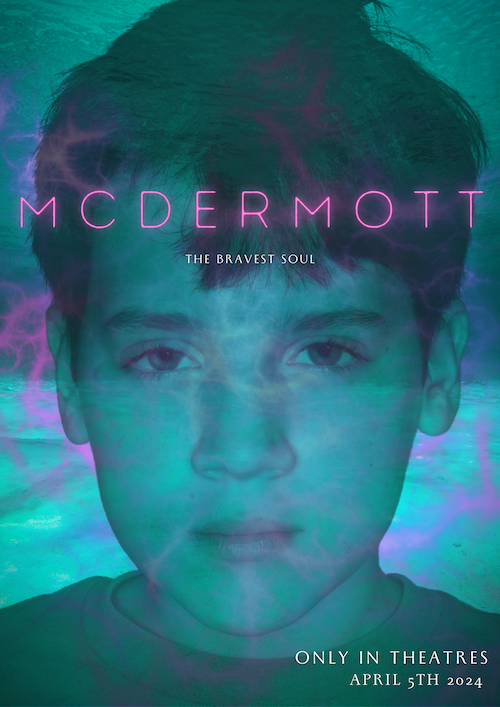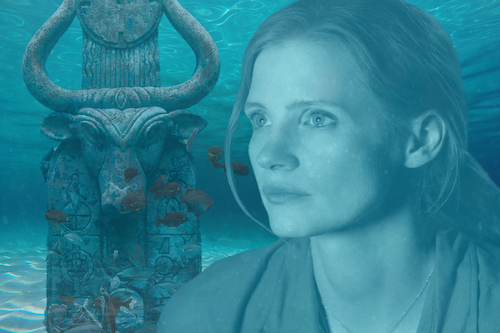McDermott: The Bravest Soul
Written by Andreas Babiolakis
Warning: The following review contains spoilers for McDermott: The Bravest Soul. Reader discretion is advised.
Are family films just not cutting it anymore? I feel like the family releases of today — be they animated or live-action — are too watered down. They are condescending to children. They don’t respect their intelligence. They act as background noise to distract kids while parents can finally fulfil their household or career-based obligations. We are missing the family films of old where parents can feel attached to their youths again and children are able to feel like they’re experiencing new worlds: a tall order in the day and age of social media algorithms and content creation miasmas that are sucking the spirit out of all of the things children are viewing on their devices. Well, it appears that I am not the only adult complaining about the state of children’s cinema, because Montrealian auteur Brian J. Scott, best known for independent films J’Adore, Honolulu and The Basis of Distress, has finally returned after years of speculation. His answer to the big budget he was graced with by Sony? McDermott: The Bravest Soul. What a picture this is, folks. I promise you you’ll never see a family film with this much inspiration, creativity, and — best of all — maturity. It’s tough to even call this a family film (hence why I have not labelled it as such above) because of how daring McDermott is willing to go with its takes on apocalyptic dread, how children are facing a dismal future and other major topics.
This is an insanely star-studded cast, from major turns by acclaimed figures like Jessica Chastain, Justin Theroux, and Simon Helberg, to bit-part blessings by titans like Liza Minnelli and Harvey Keitel, but the brightest star of them all has to be newcomer Austin Saget (who plays the titular psychic child McDermott). McDermott finds himself at the bottom of the ocean in an underwater abyss and kicks off his namesake film searching for answers. Us audience members have them too: what is even going on? For an astounding forty minutes of this nearly three-hour family epic, Saget’s McDermott acts through his facial responses, as he is broken, lost, and has no idea who he is. He is a wunderkind-to-be, and yet he doesn’t know it. As he sifts through underwater limbo, he has yet to piece together that he is to be the boy who saves humanity. For this huge opening sequence, we see McDermott finally discover his psychic capabilities as he explodes kelp farms using his vision, stops sharks in their tracks via telekinesis, and helps a seal find its missing pups using sonar powers.
Once we finally cut to dry land, we see archeologist Diane Palenstone (Chastain) stumble upon the horrific realization that Earth is about to sink into the waters below due to climate change. The effects are irreversible. Before you get upset about the left-leaning politics of McDermott, you should know that the film’s handling of such a concept is far more sci-fi and fantasy-based than what we are actively facing. In the film, the climate change is actually caused by the Delicents: a race of solar tyrants who want to turn our planet into a farm for the Solar System. Before I lose you even more, there’s nothing like seeing one Justin Theroux as the leader of the Delicents as Czar Quasilong; Quasilong is deliciously evil in a campy way as to pertain to children’s viewing, but he also feels so much like an actual political figure who only cares about their own fortune (something us adults have had to face a lot in the real world). Palenstone has no idea about the Delicents side of things, but all she knows about is the doomed fate of humanity. She panics to try and get the president (yes, Minnelli herself is the President of the United States, folks) to place some preventative measures into action, but not only will the government not listen, all of Palenstone’s ideas are too little too late (not that this is all her fault, mind you).
You’ll be left wondering what any of this has to do with the aquatic child, but after some much needed narrative building on these fronts, McDermott converges both tales. As Palenstone ventures forth into the Pacific waters of Venice Beach (as to clear her mind), she finds a surfacing McDermott who is afraid, struggling, and incapable of breathing oxygen. Palenstone dives to him and finds that he can communicate with her underwater. She has no time for marine biology breakthroughs, however, as the world’s end is imminent. With all of the psychic powers that McDermott has discovered, he offers his talents to Palenstone while they both come up with what is the actual crux of the film: relocating all of civilization to the bottom of the world’s waters. The remainder of McDermott is devoted to the efforts to find a new way of life in the depths of the ocean for a little while: so humanity can rebuild. Once Astrophysicist Dr. Watnik Palchavick (Helberg) learns of the Delicents and their intentions, McDermott turns into a war epic full of water versus fire splendour. Before civilization can defend, however, it must reconstruct, and it is in these motherly moments between Palenstone (who at the start of her parts in the film admits to having lost her teenage son to a blimp accident) and McDermott; it is their new familial bond — and the conquest of two different generations — that the world can be saved.
McDermott: The Bravest Soul is a starling achievement in what a family-based epic can be.
Once the new underwater world is built and humans are given the ability to breathe underwater via McDermott’s growing superpowers, society relearns how to conduct full-on military attacks. General Misty Quave (Keitel) leads the initial strike at the sun (years after society relocates), and that’s when McDermott becomes something even more potent in terms of commentary: how do we attack that which gives us life? How do we survive without the sun? Once the war between humans and the Delicents goes on for a whole year, McDermott now is approaching teenhood (the makeup and CGI work to make Saget look older is astounding, and not a hint of AI help is anywhere to be found). He faces the sad inevitability of the state of things: he must destroy that which he built. His calling wasn’t to create these armies. It was to stop the Delicents himself. After a fifty-minute battle sequence full of casualties (parents take note: the gore in McDermott is properly dealt with via a fantasy sense, so it won’t be scarring for children), McDermott holds his breath and ascends himself to the sun. He uses all of the energy he can muster to destroy the sun and all of the Delicents (and that mean old Czar Quasilong), subsuming all of the energy and his own detonating self, and becomes his own sun. McDermott the sun is similar to the “Superman” sacrifice in The Iron Giant: a glorious way of handling martyrdom in a way that all ages can understand and feel.
As humans leave the ocean and come back to dry land, this harkens not just the science behind evolution (and how fish climbed onto our shores and learned to breathe air) but the concept of heavenly divinity as well: this is a fresh new start to the planet where we can begin anew and eliminate poverty, war, and greed. As the sun gets renamed to honour that who gave his life for the sake of all (McDermott is now the closet star to Earth), the film concludes with the restructuring of the planet. It is a bittersweet ending that reminds me of the loss found within the freedom of Akira Kurosawa’s Seven Samurai: we can move ahead but not without reflecting on how we got to this point in the first place. McDermott: The Bravest Soul is a masterpiece unlike any other. It is criminally under-represented, and I implore you to watch this film at your earliest convenience. In the day and age of franchises and streaming services burying real, inventive art, you must watch McDermott: The Bravest Soul in order to support real cinema, filmmaking brilliance, new ideas, and raw talent. Brian J. Scott has blessed us with this untouchable all-ages, a coming-of-age epic about a child’s maturity in a world full of adults who have some growing up to do. This is not only the best film of 2024 so far. This may very well go down as one of the greatest family films of all time. Celebrate his name. It’s McDermott: The Bravest Soul.
Andreas Babiolakis has a Masters degree in Film and Photography Preservation and Collections Management from Ryerson University, as well as a Bachelors degree in Cinema Studies from York University. His favourite times of year are the Criterion Collection flash sales and the annual Toronto International Film Festival.







